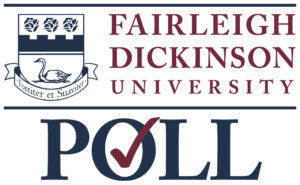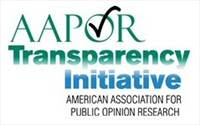Market Research and Public Interest Surveys

Since 2001, The FDU Poll has conducted survey research on issues of public importance. Utilizing best practices in survey methodology, The FDU Poll produces research that is conducted nationally and statewide. Findings from our surveys have been reported on numerous regional, national and international media outlets such as the New York Times, Washington Post, Wall Street Journal, Star-Ledger, as well as local and national broadcast media outlets. In addition, the Poll engages in research for corporate, non-profit, and government entities.
 The FDU Poll is a charter member of the AAPOR Transparency Initiative. Membership requires the Poll to provide the public with information regarding how each poll is conducted and to provide additional information when asked.
The FDU Poll is a charter member of the AAPOR Transparency Initiative. Membership requires the Poll to provide the public with information regarding how each poll is conducted and to provide additional information when asked.
Selected Past Surveys
The FDU Poll, founded in 2000 as the PublicMind Poll, has carried out high quality and high -profile survey research in New Jersey and nationwide which has had an impact on both government policy and our academic conversation. Certain research from our past continues to attract significant attention from media outlets, the public, and researchers so we have provided links to those press releases here. All of our releases since 2001 are available via our release history page.
List of Topics
- Political Knowledge
- Threatened Masculinity
- Conspiracy Theories
- Political Impact
- The War on Christmas
- Gambling and Casinos
- Segregation and Integration
Political Knowledge
The Poll has run a number of studies assessing the political knowledge of the public in New Jersey, and across the country. Most models of representative democracy requires an informed electorate, so we believe that it is important to identify the factors that lead individuals to be better or worse informed about the structure of the US government, and the controversies driving the political debate of the moment.
Major findings in this area concern the importance of news sources in determining how much people know about politics, with sources like NPR tending to increase political knowledge above baseline expected levels, and ideological news sources, like Fox News, driving it below expected levels.
- 2017: Staying Informed Across the Garden State
- 2012: What you know depends on what you watch: Current events knowledge across popular news sources
- 2011: Some News Leaves People Knowing Less
Threatened Masculinity
Gender identities, rather than just sex, are a major driver of their political and social views, and the Poll has been at the forefront of measuring gender – rather than just sex – and showing how men’s gender identities, in particular, relate to their attitudes and behaviors.
Our results in this area touch on how threatened masculinity leads men to be more supportive of Donald Trump, be more likely to get COVID-19, and “mansplain” to their relatives.
- 2021: FDU Poll finds masculinity is a major risk factor for COVID-19
- 2021: Young people, Democrats, vegetarians not looking forward to seeing family
- 2019: New Jerseyans Are Moving Beyond Stereotypical Views of Gender
- 2016: Thought of a Woman President Rattles Men
- 2016: Gender Considerations Cause Voters to Favor Democratic Candidates
- 2015: How gender plays a role in the mind of voters
Conspiracy Theories
While widespread belief in unproven conspiracy theories has become a matter of widespread attention beginning with Donald Trump’s first run for the Presidency, the Poll has been assessing belief in various conspiracy theories for more than a decade. In that time, we have identified the major role of news sources in driving people to believe in political conspiracies, as well as the role of partisanship in leading people to believe things that they would like to be true, but aren’t.
- 2016: Trump Supporters More Conspiracy Minded than Other Republicans
- 2015: Trump Claim About Muslims Celebrating 9/11 in New Jersey Spotlights Differences Among Partisans
- 2013: Beliefs about Sandy Hook Cover-Up, Coming Revolution Underlie Divide on Gun Control
- 2013: Conspiracy Theories Prosper: 25% of Americans are “truthers”
Political Impact
While political polling gets the most attention, the highest function of public surveys is as a linking institution, letting people in power know what the public thinks and wants. Over the past decades, the Poll has been able to use this informative function to influence the results of major political matters here in New Jersey, by making sure that the voice of the people is heard in the halls of power.
- 2012: Not Much Fuel for Debate: New Jersey voters don’t want to pump gas
- 2006: New Jersey Senate Race Hinges on Iraq
- 2002: Trouble for Senator Torricelli
The War on Christmas
Since 2013, the Poll has asked Americans about the purported War on Christmas: the idea that politicians are actively trying to take religious elements out of the winter holidays. In that time, we have seen enormous shifts in the proportion of the public that accepts the idea, and the composition of that group. In the past, belief was driven almost entirely by Fox News viewership and evangelical Christians. Today, Hispanic and Latino/a Americans are likely to think it’s true as well.
- 2021: Belief in “War on Christmas” Bigger Than Ever Nationally
- 2013: Politics and Media Shape Views of “War on Christmas”
Gambling and Casinos
Since the legalization of casino gambling in Atlantic City, the expansion of gambling has been a hot button issue in New Jersey politics. As sports betting and casino gambling have become more prevalent in other states, that controversy has become national.
The Poll has charted the change – and, in New Jersey, the lack of change – in people’s views of sports betting, and gambling more generally.
- 2016: Americans Bet on Legalizing Sports Wagering than Oppose It
- 2014: Majority in Garden State Opposed to Casinos Outside of AC
- 2009: Expand Casino Gambling Beyond Atlantic City?
Segregation and Integration
- 2021: Denial of Systemic Racism Drives Opposition to Police Reform
- 2021: Black Newark Residents Want More Diversity in Schools
- 2021: A year later, Newark residents see little progress on police reforms
- 2019: Joint Rutgers-Eagleton/FDU Poll: Most New Jerseyans Perceive No School Segregation
- 2017: Clueless on Affordable Housing, Yet Strong and Growing Support for More Housing Options
